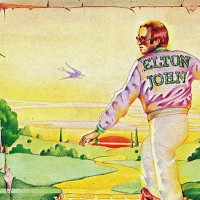This song from 1970’s brilliant Tumbleweed Connection is the reason why you have to hate Elton John’s last period.
John is never in half light any more – never so patient, so bravely remote, so note perfect. Back then, he put out piano music, with an active and jazzy rhythm section, and there was uncommon beauty.
The emotion around “Come Down in Time,” a track about lost love, is only deepened by the expressive bass work of Chris Laurence, the quiet majesty of these Bernie Taupin lyrics, and then a lonely oboe.
It’s true, the tune isn’t representative of the rest of an occasionally rough and rascally tribute to the rural South, which in 2003 was ranked No. 463 on Rolling Stone‘s list of the 500 greatest of all time. More often than not, you’ll find songs marked by a gospelly, but still honky-tonk feel – notably on “Ballad of Well-Known Gun,” “Son of Your Father,” “My Father’s Gun,” and “Country Comfort.”
But it is here, inside the spare arrangement by Paul Buckmaster, that John first successfully mines more melancholy themes that would become so familiar on 1970s radio. Even so, “Daniel” and “Rocket Man,” to my ear, have nothing on “Come Down in Time.”
John sings in the earnest, deeper version of his voice that was, back then, a tribute to Van Morrison. As he has aged, it is all that remains. But Elton John never works with this kind of dark paint anymore.
There is a timelessness inside the unfulfilled romance of the song’s characters because it mirrors our own fading allegiance to John, who has devolved into the kind of obviousness that the person who put out this record would never accept.
Twice, the song collapses into melancholy, the way our hearts will. It has nothing to do with MTV, and everything to do with the kind of connecting resonance that this once-great artist hasn’t approached in forever.
You listen in slack-jawed wonder – realizing that “Come Down in Time,” alone, could have established the legend of any lesser artist. It’s still a song that validates a career marked lately by such obvious hit-pandering and (worse, really) Disney soundtracks.
It’s still a song you never, ever want to end.
Knowing that it does, that it all does, makes the crashing end so much the more powerful:
There are women, some hold you tight
While some leave you counting
The stars in the night.
A perfect metaphor, and a sad rebuke, for what later happened to Elton John and his songs.
Hold on to this one.
- Nick DeRiso’s Best of 2015 (Rock + Pop): Death Cab for Cutie, Joe Jackson, Toto + Others - January 18, 2016
- Nick DeRiso’s Best of 2015 (Blues, Jazz + R&B): Boz Scaggs, Gavin Harrison, Alabama Shakes - January 10, 2016
- Nick DeRiso’s Best of 2015 (Reissues + Live): John Oates, Led Zeppelin, Yes, Faces + others - January 7, 2016





This is beautifully written post (I actually like it better than the song.) But I also appreciate the integrity of this early Elton, and am positively reminded of Buckmaster's orchestrations (an influence on my own.)
Elton is so unbelievably bland now. A little like what happened to Carole King. Maybe huge success just does that.
You couldn't be more wrong. Bland? What about Ticking, American Triangle, Belfast…just to name a few?
True though Come Down in Time is a masterpiece that will never be duplicated, i think there are a few songs that come close to the great classics that once were. Never Too Old is one of those pieces that makes you stop, listen and take note that Elton John is still standing.